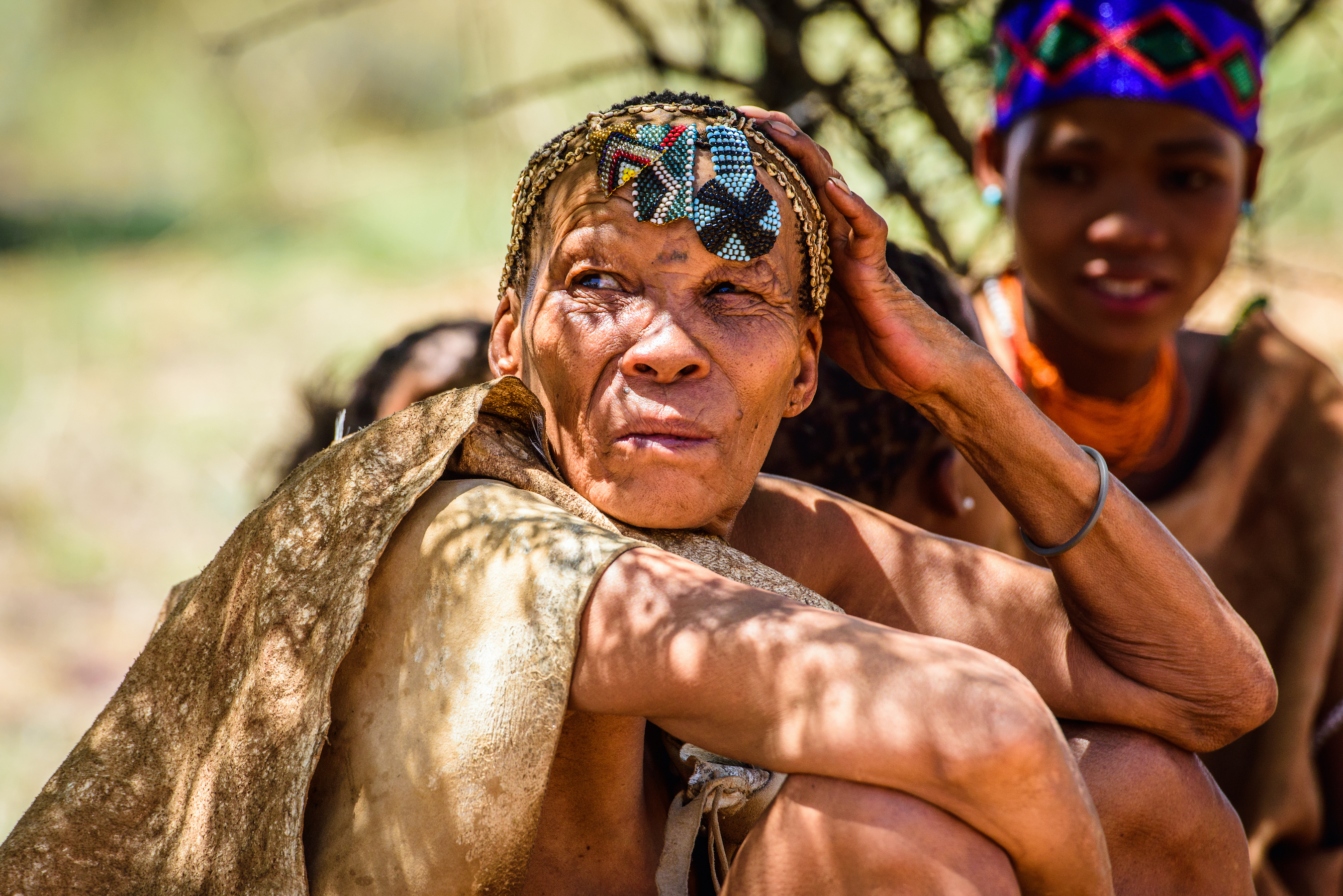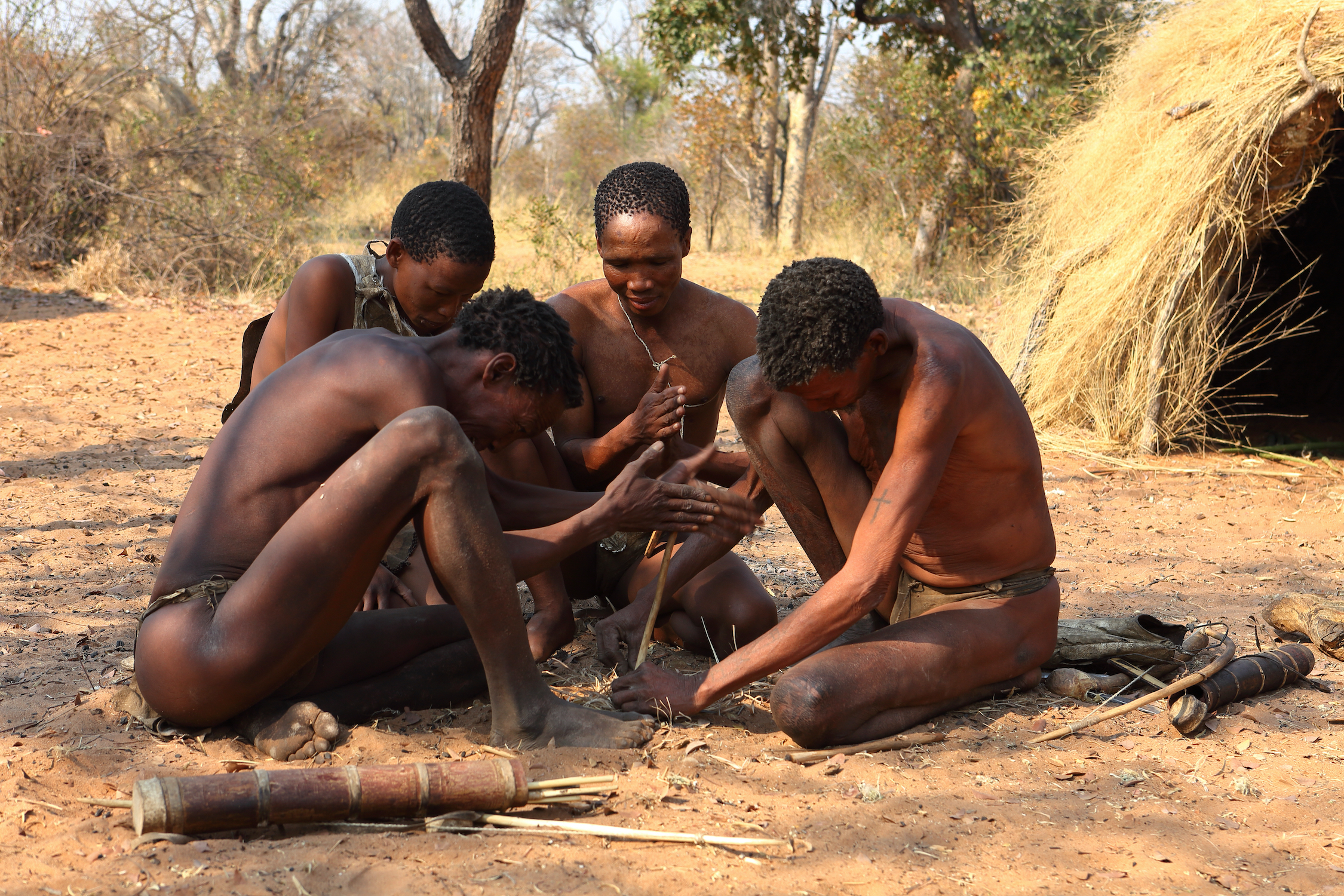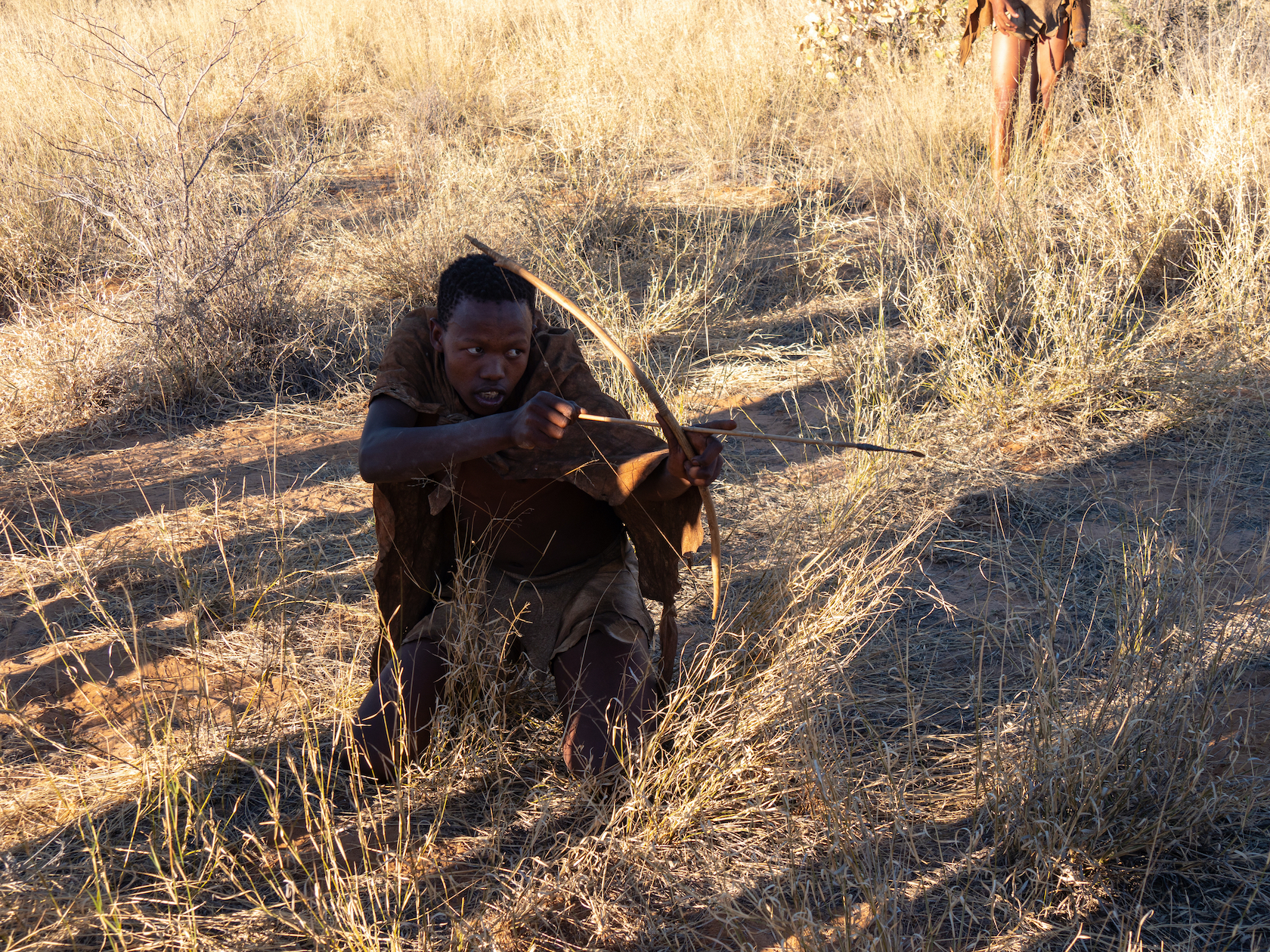In the 1990s, I began work on a mapping project with the people known as the Khomani, with the San or the Bushmen, of South Africa – people who lived on the border of South Africa, Namibia and Botswana. But it’s the community in South Africa that I was working with, and we were attempting to map with them their relationship to their world. Along the way we realised it would be tremendously helpful if we could find people who spoke the original language of that community, the language N|uu, which had been declared extinct 20 years before by very thorough scholarly academics in South Africa.
To our amazement, we heard that there was one person alive who did speak this language, a woman called Elsie Vaalbooi. I went with our colleagues, our team, including Elsie’s son, to visit her. She lived in a shack. She lived sort of under a lean-to at the side of a little shack in a dusty, dry zone on the right, in South Africa, very close to the Namibian border in the Northern Cape. And there she lay on a sort of pallet, very old, very frail.
She turned out to be about 100 years old at the time, not able to see very well. But when she heard that we had come to talk to her about her language, she was very, very excited and immediately started speaking in this language, which we thought to be extinct, and we quickly identified that it was indeed the N|uu that had been recorded in the 1930s. She told words and she began to tell stories in the language. After a while she was getting tired, but she said she wanted to record a message to Nelson Mandela.
This was 1997, not long after the ANC and Mandela had come to power.
A message for Nelson Mandela
So she took a tape recorder. We made a tape recorder available to her, and she recorded a message in N|uu and then translated it for us into Afrikaans, which is her everyday language. This message ran something like this: it is time for us, the Bushmen, to rise up and drive the farmers out of our land and recover all that is ours.
What came from this woman, of 100 years old, frail and shattered by life, really, was strong and intense defiance and a great belief that they could resist and oppose the invasions that had so devastated them. These are people who had been driven completely out of their lands, whose lives had been made more or less illegal, who had been turned into cheap labour for the farmers of the area, the Boer. Elsie Vaalbooi represented what turned out to be a large number of people who, for all that they had lost, were determined to fight back. And for many of them, the fight back was about land recognition in the society they, just as the family I'd worked with in the north tip of Baffin Island, just as they had done, Elsie and all the people of the southern Kalahari, the Northern Cape, presented themselves on film with tremendous conviction and enthusiasm.
Funeral for a language
One day when filming, a woman called Una Rooi, who was another speaker of the N|uu language – and this was some years later, almost 10 years later – she was squatting in the desert, in the sand, and she suddenly started talking about her language. And she, sitting there frail and elderly, said, you would not believe it. We took our language and we buried it. She scraped a hole in the sand, a hollow in the sand, and she picked up some small pebbles and she dropped them into this hole, this hollow in the sand. She said, you would not believe it. They did not want us to speak our language. So we took our language and we buried it as if it were a funeral. The funeral for our language. As she said that, she swept the sand across these pebbles, covering them over. And then she said, and now we are waiting until we have a place at the table, and then we will take that language out and we will live again.
These two experiences, one with Elsie Vaalbooi and then with Una, show that resistance, defiance, the will to hold on to what people have had is central to who they are, even in extreme circumstances.
This brings me to what, for me, has to be at the heart of the anthropological project, and that is an acknowledgement of racism, and acknowledgement of the brutality that people have suffered – people around the world – from imperialism and aggressive occupation of their lands. In some cases, people were wiped out mercilessly by settlers. Other places they were turned into cheap labour. In every case, their lands, their way of life, taken from them.
In every case, anthropologists who work with these people have the job of making that history, that story, that loss known and reckoned with. So in my view, anthropology has to be inseparable from the challenging of the imperialist paradigms and in many cases of the imperial process. If there's one thing that I've learned anthropologists have to do, it’s to take time and to listen.
If we take the time to listen to others, if we hear their stories, hear their losses, hear about what has happened to them, then we can begin to redress those losses. It's the job of the anthropologist to carry the narrative from the listening into the societies that are still the dominant societies of the world.
Trauma in the story
Another job for anthropology, which is inseparable from the listening and this issue of terrible loss, is the abuse that people have suffered and the consequences of abuse that are intolerable for them. The abuse of land, the abuse of language, abuse of identity, abuse of their bodies, are part of the story, and people carry these parts of the story in themselves as grief, of course, but also as trauma. And they are urging all the time that they find a way for themselves of resolving this.
Another way of looking at this, I've often thought, is to ask, where do people find their meaning? From their lands, from their religious beliefs, from their relationships with their families, from their stories that they share, from their economic activities. But those who are at the receiving end of the imperialist process, lose all those bases for meaning. They are separated from their land, that all their lands do not belong to them. They are told all their religions are untrue and false. They're told even that their languages should not be spoken; they’re the languages of the savage. They're told that their way of running an economy is not really an economy. They’re told that they're poor when in fact they've always felt rich. If all these things become embedded in the consciousness of people, then the very basis for the meanings of life are taken from them.
The job of anthropology is to understand how that has happened, what it constitutes and how it can be remedied. And once that job is undertaken, then we can enter into another kind of dialogue, a dialogue that is based on respect rather than hierarchy, the dialogue that will allow us to see that indigenous peoples around the world do know a great deal about what we need to know when it comes to the land, raising children, dealing with one another and even believing in spirits.
Indigenous people who lived by hunting, farming, herding animals in what are called traditional societies, that is to say societies that have to some extent been able to continue their way of living in their mode of economic life despite invasions from outside, those peoples know more about what is happening to the natural world than anyone else. They watch it, observe it and experience it. Their understanding of the natural world is of huge potential value, because on our side, on the side of the dominant, imperialist and aggressive capitalist models of economic progress, the environment is treated as a resource that can be torn down, drawn down and exploited in the interests of what we call economic growth.
Indigenous people used the environment always to some extent, in the interests of the environment. This was a practical and realistic matter. If they did not ensure the environment was there, they would lose their very basis for life. And so there is a huge amount that we can learn from what indigenous people see and what they have done to ensure that the environment remains stable or is resuscitated. The dialogue is one that can be of crucial value, in a world where the environment is being wrecked and where climate change is threatening further, potentially uncontrollable devastation.


